While the nation debates the morality and practicality of Canada’s new gun control law, there are businesspeople who now must worry about the economic impact of the law.
In the small town of McAdam, N.B., The Gun Dealer employs 19 people. They advertise themselves as the biggest gun store in Atlantic Canada. Along with shotguns and hunting rifles, they had offered a wide range of semi-automatic firearms as well. Now that the Liberals have banned 1,500 different “assault-style” guns from being sold, the shop’s future is in the air.
“It’s definitely going to have an effect in sales and it’s going to result in layoffs,” said The Gun Dealer’s sales manager Justin Faulkner.
“We’ve been lucky to be able to keep our full staff on during the pandemic. It’s not going to be COVID-19 that hurts our sales, it’s going to be the Canadian government.”
The Gun Dealer now has thousands of dollars worth of guns that can’t be sold, and Faulkner doesn’t know what can be done about it, or if the government will buy back the firearms.
In their press release, the federal government said they are working on a buy-back program, but the details would have to be passed in the House of Commons.
“What happens to that inventory that’s bought and paid for? What am I supposed to do with that inventory?” Asks Faulkner.
Faulkner believes the new law punishes lawful gun owners who own semi-automatics for hobbies, rather than preventing criminals from obtaining weapons. He said a lot of people just enjoy going to a shooting range and hitting paper targets for sport.
“There’s a huge shooting community that people don’t even realize (exist); law-abiding firearms owners that follow the rules,” said Faulkner.
The new gun ban comes on the heels of the tragic Nova Scotia shooting in April where a gunman killed 22 people, including a police officer. Faulkner argues that the gunman used guns illegally obtained from the United States, so the new law will not prevent criminals and mass murderers from obtaining firearms.
According to a CBC report from late April, the shooter did obtain some of his arsenal from the United States, while at least one gun came from Canada.
“So, what kind of laws that are in place now would have stopped this? He’s not going to check the firearms laws before he obtains an illegal firearm,” argued Faulkner.
“This (law) will not save lives in Canada. You have an issue with border security.”
Of course, there are those who disagree with people like Faulkner and believe restricting gun access will lower violent crimes. Dr. Rod Wilson is a family physician in Nova Scotia who advocates on behalf of Doctors For Protection From Guns.
As a doctor, Wilson has seen the tragic aftermath of gun violence.
“I’ve seen, on several occasions…the murders and suicides when guns are involved,” said Wilson. “And it’s been traumatic for me and families. There comes a time when you can’t ignore the evidence.”
Wilson supports the new gun ban, noting that gun crime in Canada has gone up more than 40 percent since 2013. He notes that other countries that have enacted tougher gun laws have seen a decrease in crime, such as Australia’s famed gun control laws.
“Other countries that have brought in legislation have done so much better than Canada. So how can we sit back and not do anything?” asked Wilson.
“Evidence suggests that legislation that restricts access (to guns)…those countries show a decrease in murder rates.”
Wilson also argues that people who use guns for hunting won’t be affected, since shotguns and other hunting rifles are still legal.
“I grew up in a hunting community; no one I know uses assault rifles for hunting,” said Wilson. “There’d be nothing left of the moose.”
A version of this story was published in Huddle, an Acadia Broadcasting content partner.




